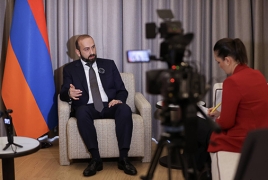Armenian FM: no territorial claims in constitution April 15, 2025 - 11:49 AMT PanARMENIAN.Net - Armenian Foreign Minister Ararat Mirzoyan, in an interview with Turkey’s NTV, responded to Azerbaijan’s demand concerning changes to Armenia’s Constitution. Asked whether the constitutional reference to the Declaration of Independence might legally obstruct a peace treaty, Mirzoyan clarified that Armenia’s Constitution includes no territorial claims against Azerbaijan’s territorial integrity. He emphasized that once signed, the peace agreement would go to Armenia’s Constitutional Court for a ruling on its compatibility with the Constitution. “If the issue is the Constitution, we must clearly state that it contains no territorial claims against Azerbaijan’s territorial integrity. The preamble references the Declaration of Independence as a foundational document, which includes various goals and values. Then come the core provisions. The Azerbaijani side interprets the declaration as a demand,” Mirzoyan explained. He said this assumption could be easily disproved by legal experts, since all relevant documents are public. Mirzoyan noted Armenia has its own concerns about Azerbaijan’s Constitution, which references its own independence declaration and identifies the modern state as the successor to the First Republic of Azerbaijan—one that claimed sovereignty over territory far beyond current internationally recognized borders, including over 60% of Armenia’s sovereign land. “That’s clearly problematic,” he stated. Still, the peace agreement being discussed contains mechanisms to address these concerns, he added. “As I’ve said, both parties recognize each other’s territorial integrity within the borders I’ve mentioned. This was essential for agreeing on the text. So, after signing, the agreement will go to our Constitutional Court for approval,” said Mirzoyan. Asked whether he is confident in the outcome, he replied: “Of course. If the Constitutional Court concludes that the treaty, including recognition of territorial integrity under the agreed interpretation and borders, is constitutional, then the issue is resolved. If the Court finds otherwise, that’s a different scenario—and the parties would return to the negotiating table.” He pointed out that several months ago, the Court had already approved the first international document on border delimitation, which was based on the same principles. “To reiterate, this is purely theoretical. Back in September, the Armenia-Azerbaijan border commissions signed their first international document—the regulation—which states that delimitation is to be based on the Alma-Ata Declaration. This principle—Soviet-era administrative borders becoming internationally recognized state borders—was upheld by the Court, which found the document fully constitutional.” He concluded that it’s unlikely the Court would reverse itself just months later on a similar issue. “Again, theoretical scenarios exist, but the peace agreement’s signing and ratification remain the most efficient and direct route to resolution,” Mirzoyan said. Earlier, Azerbaijani President Ilham Aliyev stated during a joint press conference with German President Frank-Walter Steinmeier that Azerbaijan's demands to Armenia include the dissolution of the OSCE Minsk Group and constitutional amendments to remove alleged territorial claims. Grigoryan added that the situation around the world and particularly in the region is very difficult. The Armenian Defense Ministry has denied Azerbaijan's accusations of violating the ceasefire. Armenian Prime Minister Nikol Pashinyan took to social media to thank his Lithuanian counterpart for the contribution. President of the Armenian parliament Alen Simonyan met with the Speaker of the Azerbaijani Milli Majlis Sahiba Gafarova. Partner news |